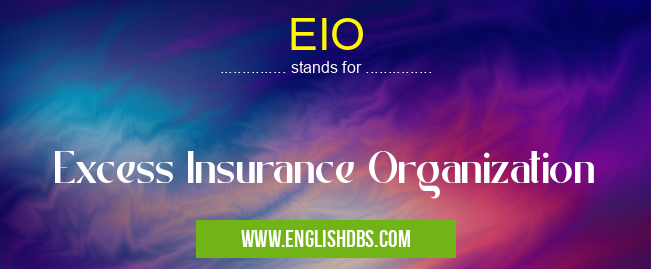What does EIO mean in INSURANCE
An Excess Insurance Organization (EIO) is an insurance provider that offers coverage above and beyond the limits of primary insurance policies. This type of insurance is designed to provide additional financial protection for individuals or businesses in the event of a significant loss.

EIO meaning in Insurance in Business
EIO mostly used in an acronym Insurance in Category Business that means Excess Insurance Organization
Shorthand: EIO,
Full Form: Excess Insurance Organization
For more information of "Excess Insurance Organization", see the section below.
How EIO Works
When a policyholder experiences a loss that exceeds the coverage provided by their primary insurance policy, the EIO will step in to cover the remaining amount. For example, if a business has a primary insurance policy with a limit of $1 million and experiences a $2 million loss, the EIO would cover the additional $1 million.
Benefits of EIO
- Increased financial protection: EIOs provide additional coverage for catastrophic losses, minimizing the financial impact on policyholders.
- Peace of mind: Knowing that there is excess coverage in place can give policyholders peace of mind and reduce anxiety about potential financial risks.
- Reduced premiums: By obtaining EIO coverage, policyholders can often negotiate lower premiums on their primary insurance policies.
Types of EIO Coverage
EIOs offer various types of coverage, including:
- Property insurance: Covers losses to buildings, equipment, and other tangible assets.
- Liability insurance: Protects against claims for bodily injury or property damage caused by the policyholder.
- Business interruption insurance: Provides coverage for lost income and expenses resulting from a temporary suspension of business operations.
Essential Questions and Answers on Excess Insurance Organization in "BUSINESS»INSURANCE"
What is an Excess Insurance Organization (EIO)?
An EIO is an insurance company that provides insurance coverage over and above (in excess of) the limits of underlying insurance policies. EIOs provide additional financial protection to organizations and individuals with high-risk exposures or those who require additional coverage beyond what is available through their primary insurance policies.
What types of insurance do EIOs provide?
EIOs typically offer excess insurance coverage for various risks, including:
- Commercial general liability
- Commercial property
- Professional liability (E&O)
- Directors and officers (D&O) liability
- Cyber liability
How do EIOs determine coverage limits?
EIOs assess the underlying insurance policies and the organization's risk profile to determine appropriate coverage limits. The limits are set to provide additional protection while ensuring that the organization has adequate coverage for its exposures.
What are the benefits of purchasing excess insurance from an EIO?
Benefits include:
- Increased financial protection beyond primary insurance limits
- Mitigation of catastrophic losses
- Enhanced risk management capabilities
- Improved insurance program stability
How do I know if my organization needs excess insurance?
Factors to consider when determining the need for excess insurance include:
- High-value assets or business operations
- Potential for catastrophic losses
- Exhaustion of underlying insurance limits
- Regulatory requirements or contractual obligations
Final Words: EIOs play a crucial role in providing financial protection for individuals and businesses. By offering excess coverage beyond primary insurance policies, EIOs help mitigate the financial risks associated with significant losses. Understanding the purpose and benefits of EIO coverage is essential for managing insurance needs effectively.
